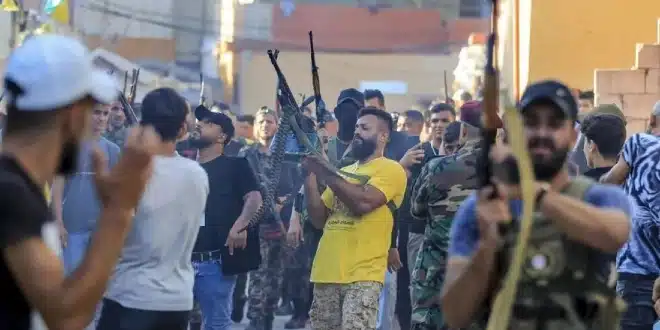Palestinian President Mahmoud Abbas held a series of meetings in Lebanon on Thursday as part of his first visit to the country in seven years. His visit, which began Wednesday and spans three days, comes at a time of renewed regional instability and ongoing concerns over the security situation in Palestinian refugee camps across Lebanon.
Abbas met with Lebanese Parliament Speaker Nabih Berri at Ain el-Tineh and also held discussions with President Joseph Aoun earlier during his trip. The leaders reached a mutual understanding on a critical security issue: Palestinian factions would not use Lebanese territory as a base for launching attacks against Israel. Additionally, there was agreement on the need to eliminate weapons not controlled by the Lebanese state.
Security in Refugee Camps and Challenges of Disarmament
Lebanon is home to 12 official Palestinian refugee camps, which fall outside the direct jurisdiction of Lebanese security forces. Over the years, these camps have become complex security environments, with a variety of armed groups maintaining a presence. The Fatah movement, led by Abbas, and Hamas are the dominant factions, but smaller militant groups, including some with jihadist affiliations, also operate within the camps.
Ein el-Hilweh, the largest of these camps, located near the southern city of Sidon, has been the site of repeated armed clashes in recent years. These confrontations have often resulted in casualties and disruption in surrounding areas. Although there was agreement between Lebanese and Palestinian leadership on disarmament, no specific mechanisms were outlined for how unauthorized weapons would be removed from camps that house tens of thousands of residents—many of whom are descendants of Palestinians displaced in 1948.
Implementing such a measure is expected to pose logistical and political challenges, particularly given the fragmented control and competing agendas among the factions operating inside the camps.
Regional Escalation and Internal Measures
The discussions come in the wake of rising tensions between Israel and groups operating in southern Lebanon. In March, Israel conducted a series of airstrikes on Lebanese territory in response to rocket fire allegedly launched by Hamas toward northern Israel. This escalation prompted a rare response from Lebanese authorities, who condemned the act and detained nearly ten suspects believed to be involved in the rocket attack. Under military pressure, Hamas was also reportedly compelled to surrender several of its members from different camps.
These developments have highlighted a shift in Lebanon’s approach to maintaining internal security and its desire to avoid being drawn into broader regional conflicts. The government’s response has also underscored growing concerns over unauthorized militant activity within its borders.
Following his meeting with Abbas, Speaker Berri briefly addressed the press regarding upcoming municipal elections in southern Lebanon. He stated that preparations for the vote were progressing and acknowledged the possibility of Israeli attacks during the election period, reflecting the heightened security risks in the region.
Abbas concluded the day’s meetings with a visit to Prime Minister Nawaf Salam at the Government Palace in Beirut. Discussions there likely continued the focus on strengthening coordination between Palestinian leadership and Lebanese authorities amid ongoing instability and external threats. Abbas’ visit underscores both sides’ efforts to manage tensions and prevent further escalation, while also addressing long-standing issues surrounding the governance and security of Palestinian refugee populations within Lebanon.


